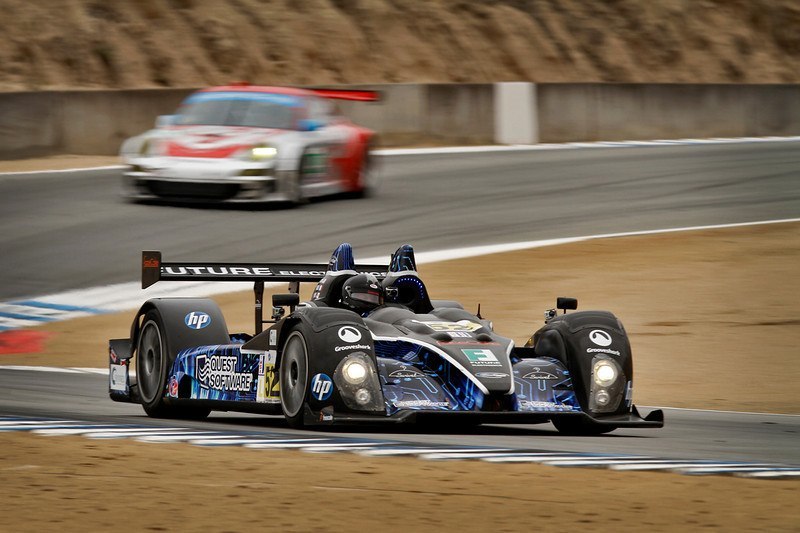
This is a transcription of a live interview between Mike Coraluzzi of MotorSportsCareerAdvisor.com and Professional Racing Driver, René Villeneuve.
Brief Bio: In 1999, René competed for the first time in the prestigious 24 Hours of Daytona in a Corvette C5-R. In 2001 and 2002 René competed in the Speed World Challenge Series. Next was a second visit to Daytona in the Grand-Am Rolex Series, driving for TRG and the Team Polizei 144 car. In 2010 he switched to the American Le Mans Series driving for a Porsche GT3 Cup car for TRG and 911Designs in the GTC Class. In 2011 René drove a LMPC car for PR1 Motorsports and thoroughly enjoyed competing in a prototype. A return a Porsche and the GTC Class with GMG Racing, earned René is second ALMS Podium at Laguna Seca.
Mike: René, can you tell me, how did you start out on your motorsports journey? If you could give us a few words on how you started out.
René: Well, Mike, I think like most young kids, I started out with the simple exposure to motorsports in the limited facet that we had in the ‘70s, Wide World of Sports.
Mike: I remember that.
René: And you develop a passion for something, sometimes not because you want to, but just because you do.
I obviously had an extended family member within the racing business, but it really didn’t come to my attention until a little bit later, before I had really formed my opinion on motorsports. And for me, it really started at the Monaco Grand Prix that I was lucky enough to go to way back. And as a very, very young boy, I was offered an opportunity to go in and see that race and that struck me in every possible way that you can imagine. The chance opportunity to be there, the level of personnel, the level of drive, the level of machinery and the environment that I saw as a first impression, it almost couldn’t miss the target, right? It had to make an impression on me. After that, I had some exposure to the 24 hours of Le Mans and that running and that’s when I really decided that, “Wow.” I actually always wanted to be involved in endurance racing.
So as, “How did I just jump into it?” Like with everybody else, I had to go to racing school. So I saved and scraped enough money together to go to racing school. I went to racing school in Canada, where I competed after going to a 3-day racing school, coming home, I competed in their runoff series which allow you to accumulate points which were worth essentially, credits to go back and do some more lapping.
From there, I just started doing as much as I could afford to do, at any given time. And then once I couldn’t afford to do it anymore, I’d go out there, make some more money, and then take some of that money and go spend it on racing again.
Mike: So how old were you for Monaco? I mean, geez, what a first impression, but how old were you for that?
René: Six-years-old.
Mike: Wow, that’s unbelievable to even just be at Monaco. Do you remember any of the racers there?
René: Yeah, you had James Hunt, Mario Andretti, Niki Lauda…
Mike: So you saw the “big guys”?
René: Yeah. John Player Special, Brett Lunger, which was an American that was driving in a March back then; Emerson too. Yeah, I remember. And access to Formula 1 was nothing like it is today; you literally walked around the cars and the drivers. It was as if you were truly part of it, whether you were or whether you weren’t.
Mike: And at what age did you get into racing school; when did that start?
René: Eighteen. Yeah, I got in when I was 18. Things have changed, obviously, right around that time, where you start carding when you’re young. I didn’t come from necessarily a racing family, even though my name would indicate such; as I said, it’s a distant relation. So for me, my growing up in the United States, my family was all about the regular red, white and blue thing. I mean, I played football, baseball, hockey and lacrosse, and sports were everything to me. And it wasn’t until I started to voice my desire to go racing that people started telling me, my parents would say, “Well, I don’t know how to do this for you,” so it was up to me.
I came out to California after graduation from high school, to go to college, and that’s when I decided that there was a change of environment, there’s a change of attitude; I was more independent and I decided I was going to do this so I took some jobs in order to make some money and paid for racing school.
Mike: That’s cool. I mean, that’s definitely a different route than playing baseball and then staying after school and all that typical stuff; that’s a harder route dare I say. Let me move onto the second question. So regarding racing school, can you discuss the advantages of an education and personal characteristics that have helped you? Is there any other types of education and were you in the garage at all?
René: Never was a mechanic. Never wanted to be a mechanic. I did work on my own personal cars, you know, fixed them up, changed ball joints, doing the carburetors, etc. My passion was 100% down to the driving.
You asked about education and I think it’s very, very important for me to say this: As a young kid starting in racing, you tend to have a giant chip on your shoulder. You go out there, you do it, you’re told you’re pretty good, and it’s very common for people to get, as we used to say, too big for your britches, right? More about themselves. I think that I thought I made an assumption that this was going to be very easy for me. I made an assumption that as soon as I went to racing school and I got a racing license, that I would find someone to give me some sponsor money and go racing and that turned out to be much more difficult than I thought.
So it really didn’t matter what I knew, it really didn’t even matter what I had done, I could have won 10 races or I could have finished last in 10 races, but the bottom line is, I didn’t have any money. There was only one way to get money and that was through relationships. And what I didn’t realize was it’s not about me. I can’t call up and expect somebody at brand X company to take my call, know who I am and listen to me seriously; actually, they don’t know me from Adam, so why are they going to understand me? Why are they going to want to understand my desires, my wants, and what it is and how that we can work together? So I didn’t understand that all. I thought it was all about me and that was the wrong approach.
Mike: So you learned and adapted, obviously; you’re still doing this. So you had to become flexible; tell me about the personal characteristics that you had to use to get through this. I guess you’re a combination businessman and racer, You’re still doing this, so how did you make that happen?
René: You know the trials and tribulations of making it on my own and to pay for my own stuff, the first time I ever made money was 1995. So I had been racing for about six years, five years, and I had an opportunity to make some money, which was terrific. But as with most things, they can be short-lived, and so you need to learn to adapt. So I learned to adapt two ways: One was to keep myself involved in racing, but one thing I realized was no matter what it is that you do, if that’s what you do, you have to do that. If you say that you’re a racing driver, you have to be a racing driver all the time. You can’t sell cars, you can’t work at a gas station, or you can’t do anything else, you have to be a racing driver and that means that any way, anyhow you stay there. So I adapted by becoming an instructor, by getting coaching clients that I would coach at the racetrack and doing anything and everything around cars so that I could learn because even when I wasn’t driving, even when I was strictly instructing or coaching, I still learned; I still learned things that I could take and apply to my driving. So it’s about being perseverant; it’s all about perseverance.
Mike: Yeah, persistence and focus.
René: Focus. You’ve got to continue. And we all get down, we all get upset, and we all don’t like it when things don’t go our way, but the bottom line is you have to stay true to what it is that you want to do.
Yes, I do have to be a businessman as well, but I got to tell you, I’m not a very good one. Had I known things were going to be this way, I honestly would have stayed in college, I would have graduated with a business or marketing degree. I would have learned how to be a businessman first; unfortunately, I became a racing driver who had to learn the business and that put me behind the eight ball. Had I been a businessman first, then I could run this as a business or make this a business and be more successful. Most of the guys that I know that are very successful at this, besides the factory guys and the guys who are just getting hired, they’ve done it by being a smart businessman and making racing part of their life and part of their business, and that’s really the good way to go about it.
Mike: That’s interesting. Do you have any advice for newer motorsport job candidates? Because this is all about jobs, careers, guidance and more. Because you’ve seen a lot of it, as far as motorsports, in general. Advice for folks who are getting out of school, like I mentioned previously. Purdue actually has a program and other universities have programs; what would you tell those guys? Would it be the same thing you just told me a minute ago?
René: Well, yes and no. I mean, perseverance is key. Being out there is key. Find anything and everything to do. If you’re a student and you’re taking an engineering course and you’re looking towards motorsports, then on weekends, you should be working for a SECA team or your buddy’s NASA team, or call up somebody that runs a Porsche Club of America or a BMW Club team; they’re always looking for guys because everything about racing and the beauty of motorsports is it’s never the same. It doesn’t matter if you’re the driver, the crew chief, a mechanic, a sponsor or a fan, it’s always evolved and one moment is never exactly the same as the other, so you’re constantly learning, you’re constantly seeing new things. As a mechanic, you’re going to get out there and this race might be boring. You might get the car prepped, you put it on the grid and it never comes back until the end and then you’re done and you put it away; the next race, there’s a flat tire, it starts to rain and you’ve got to change the flat. You’re going to gain experience every time you’re there.
The books are great, and I think what’s happened lately is with the technology becoming what it is, there’s more and more people that are intellectually smart that are involved in racing because it is much more precise of a mathematical and an engineering situation now, but you can’t replace passion of what you do with education. You could be highly educated, but not really have the passion to do it and you will not succeed. If your balance is tipped in the opposite direction and you have a lot of passion and the education that goes with it, you will succeed. You truly will succeed because when you get involved in it, you’re going to realize that it’s not as glamorous as anybody thinks it is. And as an engineer, as a mechanic, as a crew member, it’s requires long hours, long days, long weekends, and you’re going to find that you’re mentally always thinking about what’s going on. How can I make the racecar better? How can I manage this? How can I solve those problems? How can I get the driver to like the car based upon his feedback? You become absorbed with it, and in order to be in a business that you’re absorbed in, you need to be passionate for it.
Mike: That’s great stuff. You touched on my questions regarding the biggest challenges and advice for newer motorsport candidates.
I have one question left and then maybe you can add something there. So let me backtrack and ask you: what was the number one trait or characteristic you think contributed to your success? Because you’re still doing it, I mean, it is tough but is there a “number one” characteristic that you say those people who want to get in it should be built with and should have?
René: My career, which is now at well, let’s call it somewhere about the 25-year mark, has had its ups and downs. And when I say 25 years, there were years that I didn’t race at all, but that doesn’t mean I wasn’t involved. That doesn’t mean that mentally, I wasn’t involved. That doesn’t mean that I had lost focus or sight of what I wanted.
And again, I think the number one thing was because of my passion, I never gave up, in the big picture. If this is what you want, you can’t give up. You’ve got to persevere. You’ve got to continually try whatever it is. Be flexible. If you want to be someone that the chassis engineer, if they offer you an opportunity to come out and be the aero assistant or just a tire changer, take that opportunity. Be flexible. Anything you can do.
And remember, it’s not about you, it’s about people, it’s about a team. Once you’re involved in a team, it’s truly about that team. Until you’re involved in that team, you have to respect other people and that’s the only way that they’re going to in turn respect you. If you’re too driven and that drive comes out as an attitude, a chip on your shoulder, people will see it, they’ll recognize it and they won’t want to work with you.
Mike: So maybe, I don’t want to oversimplify it, but maybe it’s passion and focus; maybe it’s those kind of things.
René: I would say it’s passion and focus. And the beauty of this sport is you can simply it. There is a way to look at things and go, “Look, there’s no guarantee that you’re going to be successful.” And again, success is a relative term. Some people are happy to be in any form of racing and to do it as a hobby because they’re passionate about it; other people need to be in Formula 1; others, still yet, need to be with a factory, like a Porsche or an Audi. So whatever your goals are, that’s what’s going to dictate your success. I consider myself a success, not because I’ve done this, been there, won this, etc., I consider myself a success because for 25 years, I’ve made this business work for me and I’ve been able to feed my family, raise my children, pay my rent, my mortgage, and make it my life. It is all encompassing my life, that’s what I consider success because that’s where I want it to be.
Mike: Well thanks for the interview René. It’s always awesome to hear the “reality” of the business from a successful expert on the inside.
René: Yes, thank you.
Mike: Bye now.
*Contact René here at http://www.renevilleneuve.com/Rene_Villeneuve/Home.html for Press details, Driver Information, Driver Coaching and Instruction.



